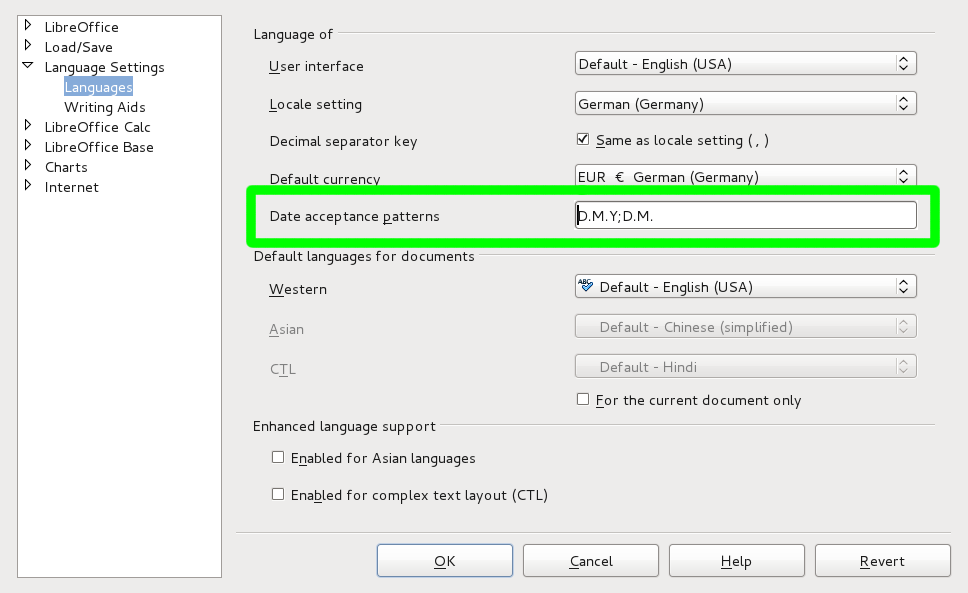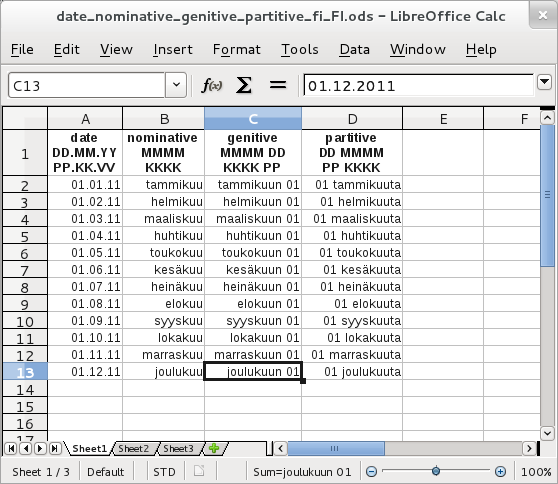Poss...what? you may ask.. yes, the month that owns the day-of-month.
In some languages (and thus locales) a month name has different cases, depending on the context the name is used in. That's for example the case in Slavic languages, Greek, Russian, Finnish, Gaelic, ... and probably a few more I didn't hear of. Totally unknown to native English speakers ;-) (which I'm not)
- a standalone month name is the nominative case, the noun, as in November
- a possessive genitive case month name can be described as "the month's day", as in November's 17th
- a partitive case month name can be described as "day of month", as in 17 of November
This feature in number formatting was requested for quite some time. Recently I found time to implement it. To achieve this, I added optional elements to LibreOffice's internal locale data <LC_CALENDAR><Calendar> element and implemented the general rules in the number formatter.
Locale data (submitted by localizers)
- <MonthsOfYear> element, nominative (nouns) month names
- always specified
- includes <Month>, <MonthID>, <DefaultAbbrvName> and <DefautFullName> elements
- <GenitiveMonths> element, genitive case month names
- optional
- follows the <MonthsOfYear> element
- consists of same elements as <MonthsOfYear> element
- if <GenitiveMonths> are not specified then <MonthsOfYear> names are used in the context of the number formatter's genitive case
- <PartitiveMonths> element, partitive case month names
- optional
- follows the <GenitiveMonths> element, or follows the <MonthsOfYear> element if the <GenitiveMonths> element is not specified
- consists of same elements as <MonthsOfYear> element
- if <PartitiveMonths> are not specified then <GenitiveMonths> names are used, if that is not specified then <MonthsOfYear> names are used
Rules for use of nominative / genitive / partitive case month names in number formatter when encountering MMM or MMMM
- MMM or MMMM immediately preceded or followed by a literal character other than space ⇒ nominative month name (noun), for Excel and backwards compatibility such as Finnish MMMM"ta"
- no day of month (D or DD) present in format code ⇒ nominative name
- day of month (D or DD) after MMM or MMMM ⇒ genitive name
- no genitive names defined ⇒ nominative names
- day of month (D or DD) before MMM or MMMM ⇒ partitive name
- no partitive names defined ⇒ genitive names
- no genitive names defined ⇒ nominative names
NOTE:
If only <MonthsOfYear> and <PartitiveMonths> are specified but not <GenitiveMonths>, then for MMM(M) D(D) formats the <MonthsOfYear> nominative name is displayed. Only for D(D) MMM(M) formats the <PartitiveMonths> name is displayed.
If only for MMM(M) D(D) formats the <GenitiveMonths> are to be displayed but nominative names for D(D) MMM(M), then specify <PartitiveMonths> identical to <MonthsOfYear>, do not omit it as otherwise it would inherit from <GenitiveMonths> again.
Screenshot
To illustrate, here's a screenshot using the Finnish fi-FI locale, Finnish is an extraordinary case that uses all three, nominative, genitive and partitive case month names.
Locales featuring month name cases
Currently for the following locales genitive and/or partitive case month names were contributed:
- [an-ES] Aragonese, Spain
- [ast-ES] Asturian, Spain
- [be-BY] Belarusian, Belarus
- [fi-FI] Finnish, Finland
- [gd-GB] Gaelic (Scottish), United Kingdom
- [la-VA] Latin, State of the Vatican City
- [lt-LT] Lithuanian, Lithuania
- [ru-RU] Russian, Russia
As you can see, that's only a few locales and not all that should be covered.
So if you're working on localization of LibreOffice and your language uses
month name cases, please contribute the locale data additions as lined out
above. Best send a patch of your locale's .xml data file as attachment to the
developer mailing list and I'll pick it up. If uncertain how to do that just
ask and we'll help. For an example how the data looks like see
i18npool/source/localedata/data/lt_LT.xml
and search for GenitiveMonths. If you're interested in technical details of locale data files see
i18npool/source/localedata/data/locale.dtd
Happy month casing :-)

